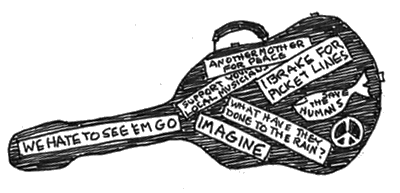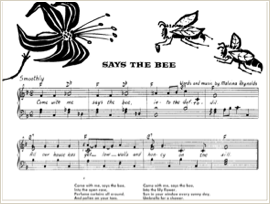


My
letter to the Times about their young hip librarian article got printed
in the Sunday paper, along with another letter about how as usual, the
article didn’t mention the important things librarians do—literacy
programs and all—but then, it was
the style section. It wasn’t that the students I went to library school
with in 1963-65 were intrinsically hipper than the library students of
the eighties, it was the times. I was commuting from Potrero Hill in San
Francisco, first ride-sharing with Jodi Robbin, who was in grad school
in art, then with Margie Wilkinson, the daughter of one friend of my
mothers and daughter-in-law of another. Margie was working in the
administration building and drove a tiny Morris Minor. I drove alone
some days in my flowered VW bug and would usually pick up a barbecued
chicken from the co-op supermarket on University Avenue for dinner,
going into a kind of hunger delirium from the smell as I drove across
the Bay Bridge, getting the bird home intact by an exercise of
willpower. (Now that I think about it, I seem to remember that I did it
by putting the chicken in the back seat where it would be harder to
reach, though in a VW bug everything was pretty much in reach.)
When the Free Speech Movement
occupied Sproul Hall, I feared that my ride home, Margie, was in there.
I went in, and sure enough, there she was. I forget how I got home, but
the next day, when we found the police had dragged all the sitters-in
down the stone stairs, we went out on strike. Only two from the library
school were jailed, Virginia Walter, who became one of my best friends
later when we both worked at San Francisco Public Library and now
teaches in the library school at UCLA, and someone else, I forget who.
We were picketing the library building because it had classrooms in it,
and had to explain to everybody that we weren’t picketing the library
itself, it was fine with us if people went in there. Some of us went
around to explain to our professors what we were doing, and why. I had
never been a shining star in cataloging class, and our teacher, Mrs.
Frugé, always seemed distant—she lectured to the ceiling, not to us—so I
didn’t expect much from her. But when we told her about the police
brutality, she said “I understand perfectly. My family escaped from the
Nazis.” And when I thought about it, I
understood perfectly why the students were willing to risk jail or
expulsion to storm the administration building. Yes, it was about free
speech, but I remember so many times sitting on the steps of that
building at the beginning of a semester in tears of frustration because
some bureaucratic rule had kept me from doing something that seemed
perfectly reasonable and necessary to me.
For
instance, I needed only six units my last undergraduate semester to
complete my required units for graduation. For the first time, I didn’t
have a scholarship requiring me to sign up for at least twelve, so I
signed up for seven. The clerk said I couldn’t, it had to be at least
twelve. I went to the dean and asked why. He said, “If we let people
take take seven units, we’d have every housewife in Berkeley in here.”
Ten years later I would have thought him a male chauvinist pig. At the
time I just thought, “Not every housewife in Berkeley lacks six units to
graduate, you idiot!” Since I was working part-time, he let me take ten
units. What I did was sign up for a music appreciation class, which I
enjoyed. That final was my only test scheduled for the second week of
finals, so I skipped it and went off on my honeymoon. I flunked music
appreciation, the only flunk of my career, and one anybody would know I
did on purpose. So there.
My
favorite story about the Free Speech Movement was when the police went
into the president’s office and saw papers all over the floor and
assumed the students had trashed the place. “Oh, no,” said his
secretary, “it always looks like this!”
When
I was in my first job, at the Marina Branch in SF, I ran into Mrs.
Frugé at a California Library Association conference and told her I had
gotten a job at San Francisco Public. “Oh, you poor dear!” she said. I
was puzzled until I was transferred to the Sunset branch and saw in the
card catalog a subject heading Mrs. Frugé would never have approved:
Union of Soviet Socialist Russia.
My
father was a little disappointed when I went to library school. He
wanted me to be a labor lawyer or a diplomatic attaché or something. He
became reconciled to my choice of profession a few years later when I
came home from an American Library Association conference with the story
of Zoia Horn,
who went to jail for refusing to give the FBI the library records of
one of the Berrigan brothers. Those times have come again. Librarians
now have to deal with the “Patriot” Act, under which we not only are
supposed to turn over circulation records and internet use histories to
the feds, but not tell anybody we’ve been asked to do it. In Berkeley,
we erase records as fast as we can, and a lot of libraries do the same.
The American Library Association has put out a statement against National Security Letters, a form of administrative subpoena issued without judicial oversight or adequate judicial review. So there.

Sunday, July 15, 2007


THE SIXTIES: LIBRARY SCHOOL






